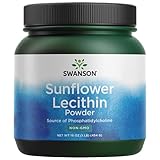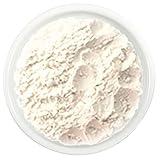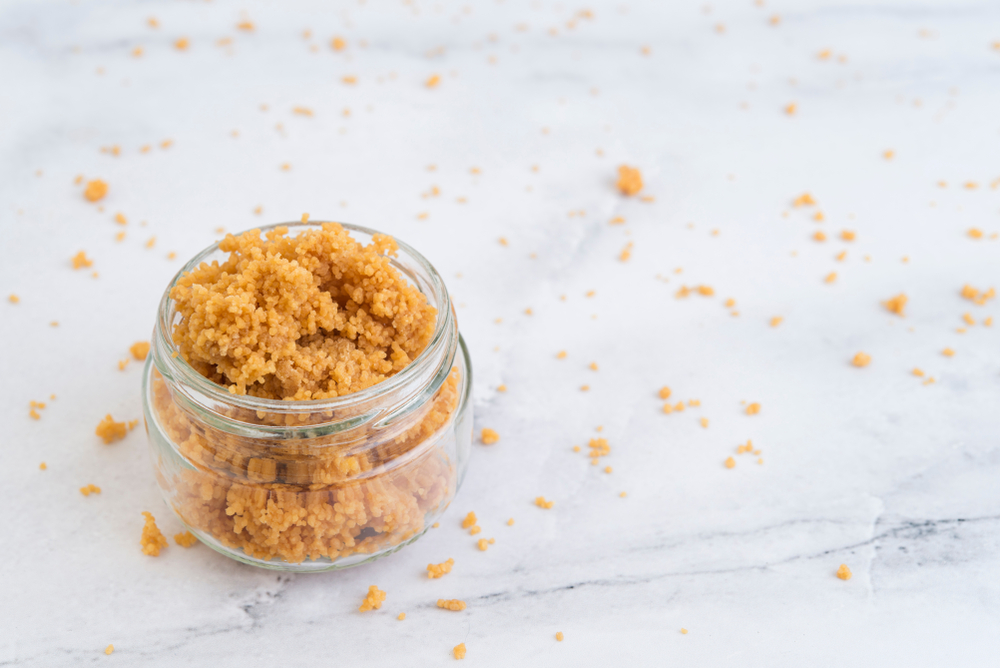While it’s healthiest to eat a diet rich in whole foods, most of us eat foods that are at least somewhat processed regularly. Processed foods have added ingredients to help improve their texture, maintain freshness, and improve shelf life. Reading through the ingredients list of some processed foods can be overwhelming, especially in highly-processed foods with a laundry list of ingredients.
Soy lecithin is gluten-free. Soy lecithin is an additive used in processed foods and also as a supplement. It helps emulsify, thicken, and stabilize foods and also is taken as a supplement for its numerous potential health benefits. Other gluten-free alternatives to soy lecithin include Swanson Non-GMO Sunflower Lecithin, Thrive Market Organic Tapioca Starch, and Frontier Co-Op Gum Arabic Powder.
If you’re curious about what soy lecithin is used for, its potential pros and cons, and some other gluten-free alternatives, you’re in the right place.
Contents
What is soy lecithin?
Lecithin is a type of food additive made from different sources. Lecithin acts as an emulsifier and lubricant. Lecithin can also be used as a flavor protector by preventing the oxidation of ingredients.
Soy lecithin is made from soybeans and is the most common type of lecithin. Lecithin can be made from animal products. Another popular type of lecithin is sunflower lecithin which is often taken as a supplement. Sunflower lecithin is popular among breastfeeding mothers to help prevent clogged milk ducts.
Lecithin is found naturally in some foods, but the majority of lecithin is extracted and used as a dietary additive or supplement.
What is soy lecithin used for?
Soy lecithin is an additive in many types of foods. You probably use or eat products with soy lecithin in them regularly and might not be aware of it.
Soy lecithin is found in dietary supplements, dairy products, chocolates, margarine, bread, and other processed foods. Soy lecithin acts as an emulsifier. Emulsifiers help blend ingredients that would otherwise separate.
Is soy lecithin gluten-free?
Soy lecithin is gluten-free and is safe to consume if you have Celiac disease or are otherwise sensitive to gluten.
What are the advantages of soy lecithin?
Soybeans are a popular crop and are subsidized by the United States Government along with corn. Ingredients from subsidized ingredients tend to be cheaper for food manufacturers.
Soy lecithin is an inexpensive way to help keep liquids mixed that would otherwise separate – like oil and water. It can also help thicken foods and improve their texture.
What are the potential health benefits of soy lecithin?
One of the main components of lecithin is phosphatidylcholine, which is likely responsible for some of soy lecithin’s potential health benefits when taken as a supplement.
Many of the studies on lecithin for health have been done on animal subjects. While animal subjects can be promising for human health, it by no means is conclusive that similar results can be expected in humans.
The soy lecithin supplements typically contain more phosphatidylcholine and less soy since phosphatidylcholine is the active ingredient with potential health benefits.
Cholesterol-lowering
In a study on humans, study participants took 500 milligrams of soy lecithin daily. Other test groups took a placebo or 500 milligrams of soybean oil. After two months, the average total cholesterol was reduced by 42.6% and LDL (“bad”) cholesterol was reduced by 56.1%.
The reduction in cholesterol was significant in that study. Reducing cholesterol by just 10% can cut your risk of heart disease by over 25%. The researchers concluded that soy lecithin can be used as an adjunct treatment in people with high cholesterol.
Immune health
A study on rats found that lecithin supplementation increased macrophage (a type of white blood cell that helps kill unhealthy cells) and phagocytic (immune system cells that are the first line of defense against foreign pathogens) capacity. It also boosted lymphocytes, another type of white blood cell that helps protect against foreign invaders like bacteria and viruses.
Digestive advantages
One of the more common digestive disorders is ulcerative colitis, the most common form of inflammatory bowel disease worldwide. Ulcerative colitis causes idiopathic (unclear of the cause) inflammation of the colon.
People with ulcerative colitis tend to have lower concentrations of phosphatidylcholine in their intestinal mucus compared to healthy people. Researchers think that might be one of the potential causes of ulcerative colitis.
Researchers say that phosphatidylcholine supplementation can help reduce inflammation in people with ulcerative colitis, which can reduce symptoms. They concluded that it may become a “first-choice therapy” for people suffering from ulcerative colitis.
Cognitive function
You might have heard of choline before. Choline is a part of phosphatidylcholine in soy lecithin and plays a role in brain health and cognitive function. Choline is important for brain development and may aid in memory and learning.
Your body makes a hormone called acetylcholine from phosphatidylcholine. Acetylcholine is important for memory and might help improve symptoms of Alzheimer’s disease, a type of dementia.
Therefore, soy lecithin may help promote brain health due to its choline content. However, there aren’t currently studies on soy lecithin in that aspect.
Is it safe for those with soy allergies?
Soy lecithin might be safe for people with soy allergies. According to the University of Nebraska-Lincoln’s Food Allergy Research and Resource Program, soy lecithin “does not contain sufficient soy protein residues to provoke allergic reactions in the majority of soy-allergic consumers. Many allergists do not even advise their soybean-allergic patients to avoid soybean lecithin when it is included as an ingredient [in] food products.”
What are the potential disadvantages of soy lecithin?
GMO soybeans
Soy lecithin is usually made from genetically modified soybeans. Many people prefer to avoid genetically modified organisms (GMOs) for fear that they might be bad for your health. However, soy lecithin has been approved as a “generally regarded as safe” (GRAS) ingredient by the Food and Drug Administration.
If you want to avoid GMOs, choose GMO-free soy lecithin or organic soy lecithin.
Potential side effects
Most people tolerate soy lecithin well. It’s present in low amounts in processed foods, so the risk for adverse side effects is low.
The potential side effects from eating soy lecithin are diarrhea, nausea, stomach pain, or fullness.
Soy debate
The use of soy has been debated in the health and nutrition world for decades. Proponents of soy argue that it’s rich in nutrients and antioxidants and can help fight cancer. People who oppose soy prefer to avoid it because soy is rich in plant-based estrogens, which might not be safe for people who have had certain types of breast cancer.
Most healthcare professionals only advise women with a history of estrogen-receptor-positive breast cancer or who are taking hormone therapy to avoid soy supplements. Soy supplements are much more concentrated than soy found in foods or soy lecithin.
Soy Lecithin Nutrition Information
Most of the soy lecithin readily available to buy is in supplement form. Soy lecithin typically isn’t used outside of food manufacturing, so you won’t find it at your local grocery store to use in your cooking or baking.
NOW Foods Non-GMO Lecithin, 1200 mg
Ingredients:
- Non-GMO Soy Lecithin
- Softgel Capsule (Bovine Gelatin, Glycerin, Water)
- Non-GMO Soybean Oil.
Nutrition Facts (per 3 capsules):
- Calories: 30
- Total Fat: 2.5 g
- Saturated Fat: 1 g
- Non-GMO Soy Lecithin: 3.6 g
- Phosphatidylcholine: 500 mg
Bulk Supplements.com Lecithin Powder
Ingredients:
- Soy Lecithin
- Gelatin
- Glycerin
- Water
Nutrition Facts (per 0.5 tsp./1200 mg):
- Calories: 6
- Total Fat: 1 g
- Soy Lecithin: 1200 mg
Puritan’s Pride Soy Lecithin
Ingredients:
- Soy Lecithin
- Gelatin
- Vegetable Glycerin
Nutrition Facts (per 1 softgel):
- Calories: 10
- Total Fat: 1 g
- Soy Lecithin: 1,200 mg
Puritan’s Pride Soy Lecithin Granules
Ingredients:
- Soy Lecithin
Nutrition Facts (per 1 tbsp.):
- Calories: 60
- Total Fat: 4 g
- Saturated Fat: 1 g
- Total Carbohydrate: <1 g
- Soy Lecithin: 8,000 mg
- Phosphatidylinositol: 960 mg
Soy Lecithin Alternatives
Swanson Non-GMO Sunflower Lecithin
 Sunflower lecithin is a popular alternative to soy lecithin because it’s free of soy. This particular lecithin is also vegan, unlike some soy lecithin products.
Sunflower lecithin is a popular alternative to soy lecithin because it’s free of soy. This particular lecithin is also vegan, unlike some soy lecithin products.
Ingredients:
- Sunflower Lecithin
Nutrition Facts (per 3 tbsp.):
- Calories: 130
- Total Fat: 14 g
- Saturated Fat: 3 g
- Sodium: 0 mg
- Total Carbohydrate: 0 g
- Protein: <1 g
Thrive Market Organic Tapioca Starch
Tapioca starch (tapioca flour) is a popular gluten-free thickener. It can be used in gluten-free baking and thickens foods like soups, sauces, and pie fillings without impacting the flavor.
Ingredients:
- Organic Tapioca Starch.
Nutrition Facts (per 1 tbsp.):
- Calories: 30
- Total Fat: 0 g
- Saturated Fat: 0 g
- Sodium: 0 mg
- Total Carbohydrate: 8 g
- Dietary Fiber: 0 g
- Protein: 0 g
Frontier Co-Op Gum Arabic Powder
 Gum arabic powder is used as a thickener, stabilizer, and emulsifier in foods. It’s made from African trees and is gluten-free.
Gum arabic powder is used as a thickener, stabilizer, and emulsifier in foods. It’s made from African trees and is gluten-free.
Ingredients:
- Gum Arabic Powder
Nutrition facts: not available
Related Questions
Is soy lecithin bad for you?
Soy lecithin is a safe food additive unlikely to cause any adverse health effects. In processed foods, soy lecithin is present in very small amounts. Soy lecithin is rich in phosphatidylcholine, a chemical found naturally in foods like eggs and soybeans. Studies on phosphatidylcholine suggest that it can provide health benefits.
Is soy lecithin dairy?
Soy lecithin is often used in dairy products as an emulsifier. It doesn’t contain dairy on its own, though.
Is soy lecithin vegan?
Soy lecithin is vegan, just like soybeans. Certain soy lecithin supplements may contain animal-based ingredients like gelatin, so always check the labels to ensure if it’s vegan.
